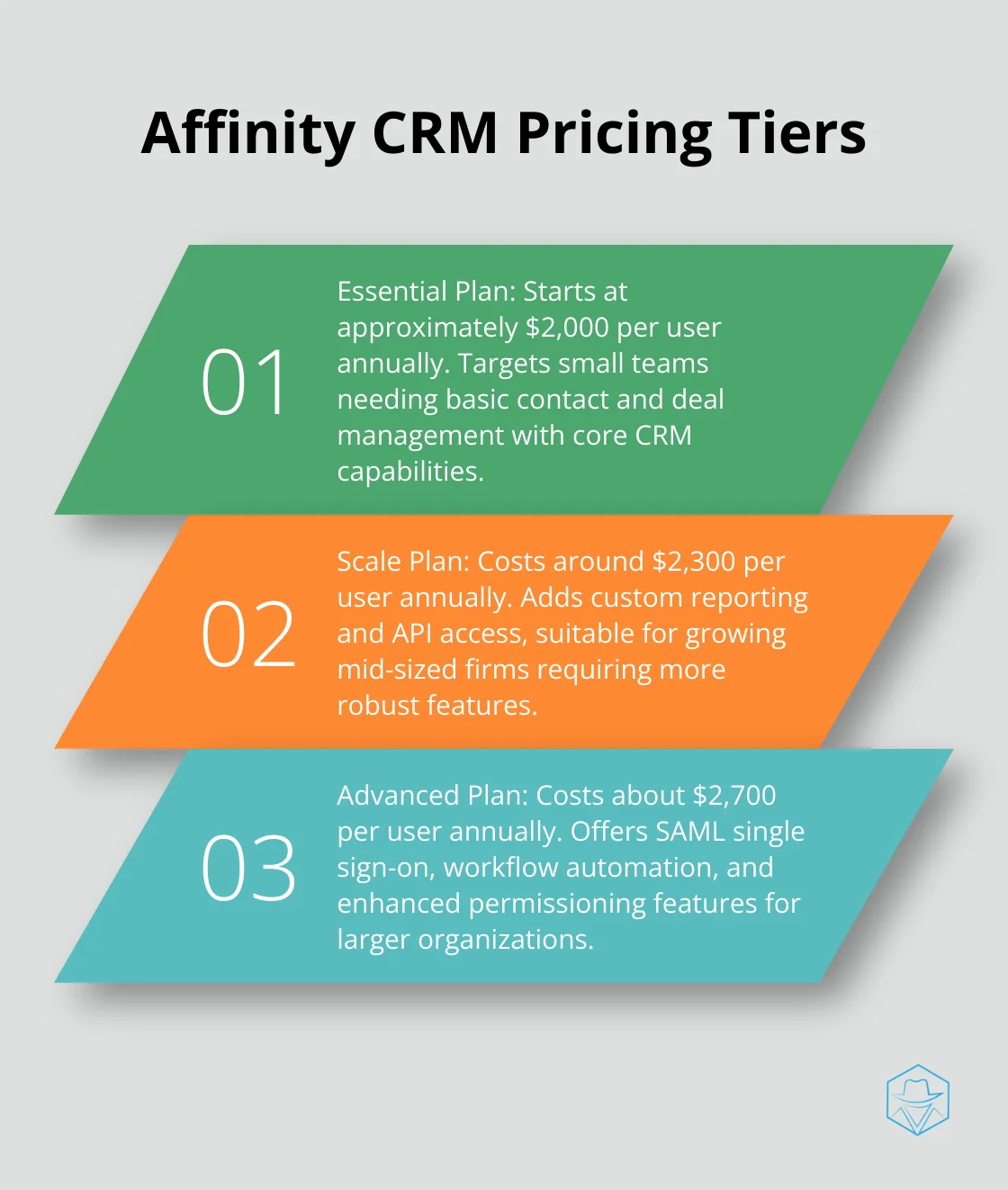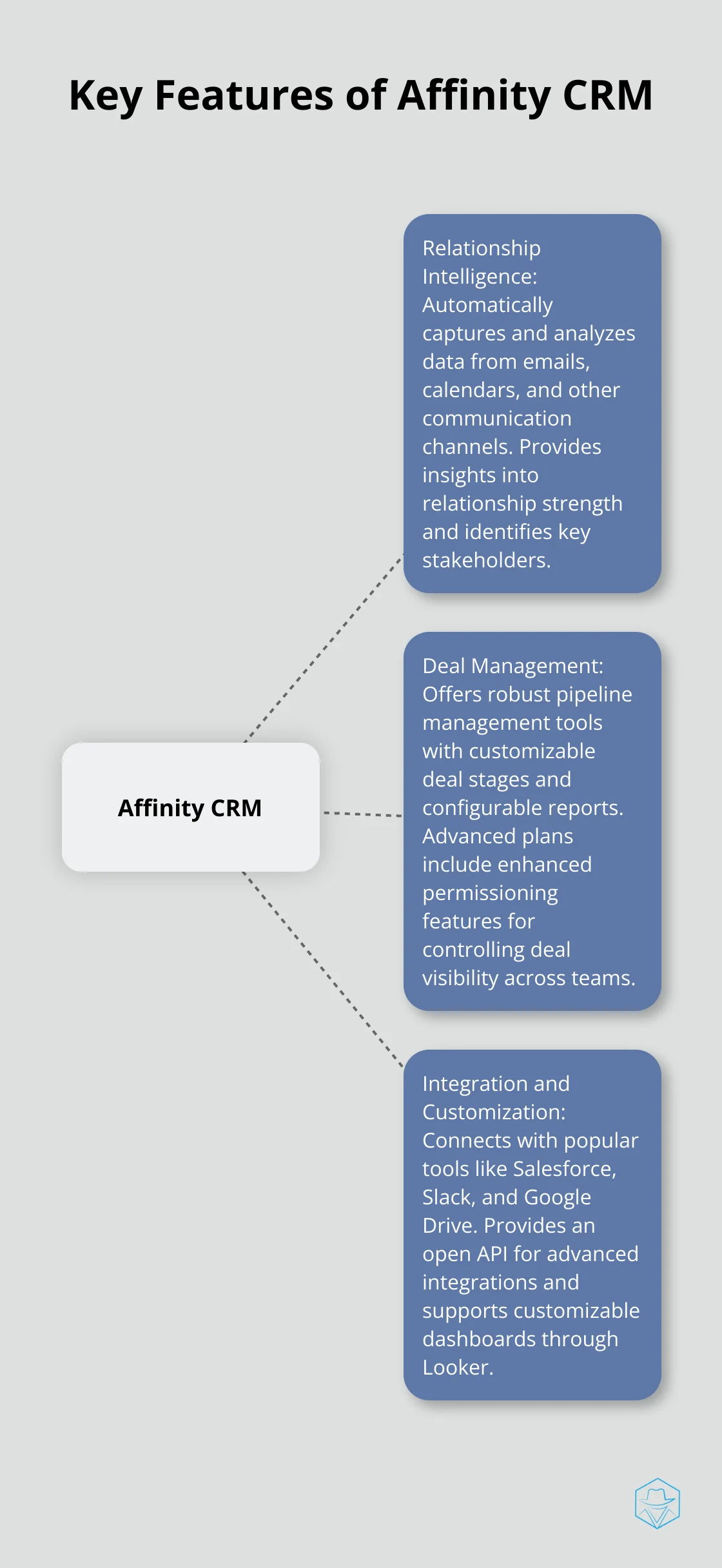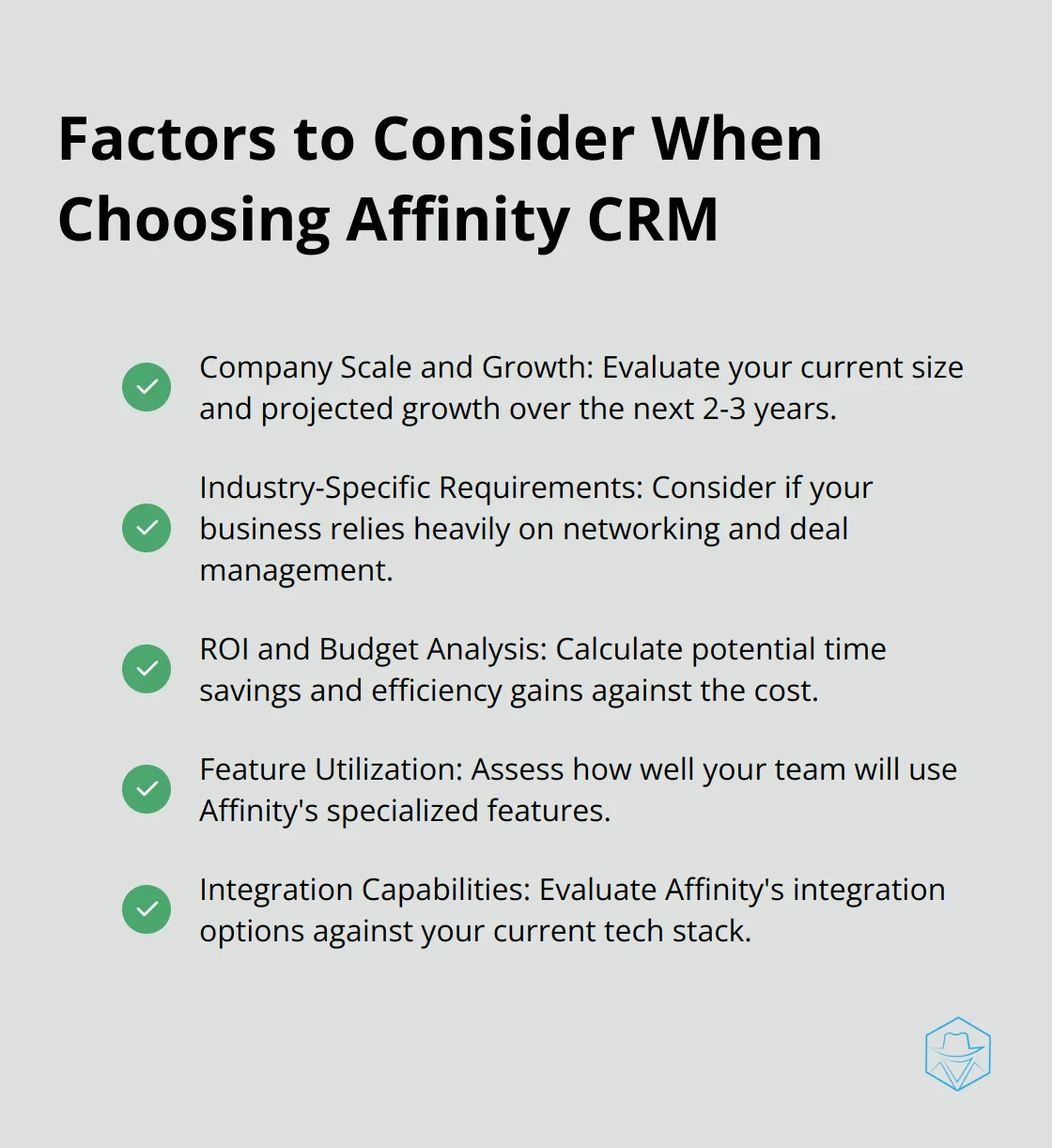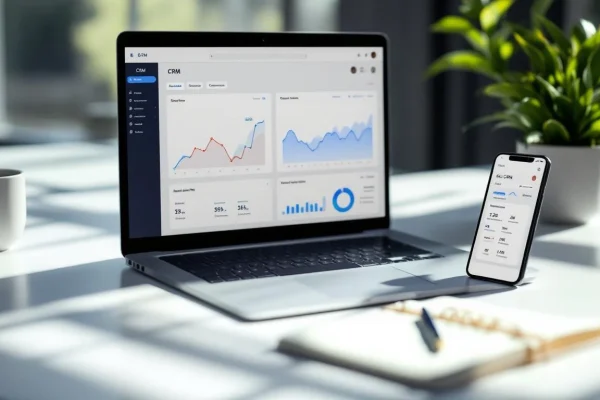Affinity CRM Pricing: Is It the Right Fit for You?

At Drop Cowboy, we understand the importance of choosing the right CRM for your business. Affinity CRM has gained attention for its unique approach to relationship intelligence and deal management.
But is Affinity CRM pricing aligned with your budget and needs? Let’s explore the costs, features, and factors to consider when evaluating this platform.
What Does Affinity CRM Cost?
Pricing Tiers and Features
Affinity CRM offers four main pricing tiers to accommodate different business sizes and needs. While Affinity doesn’t publicly disclose exact pricing, we’ve compiled information from various sources to provide a clearer picture.
The Essential plan starts at approximately $2,000 per user annually. This tier targets small teams that need basic contact and deal management. It includes core CRM capabilities but lacks advanced automation features.
The Scale plan costs around $2,300 per user annually. It adds custom reporting and API access, making it suitable for growing mid-sized firms that require more robust features to manage expanding networks and deal pipelines.
For larger organizations with complex compliance, security, and automation needs, the Advanced plan costs about $2,700 per user annually. This tier offers SAML single sign-on, workflow automation, and enhanced permissioning features to control deal visibility across teams.
The Enterprise plan comes with custom pricing. It caters to large firms with advanced compliance requirements and the need for dedicated support. This tier includes all features from lower tiers plus additional customizations.

Industry Comparison
Affinity positions itself as a specialized CRM for relationship-driven industries (such as venture capital, private equity, and investment banking). This focus on relationship intelligence and deal management distinguishes it from general-purpose CRMs.
HubSpot CRM, a popular alternative, offers a free plan for up to 2,500 contacts, with paid plans ranging from $20 to $100 per user per month. While this might appear more budget-friendly, especially for smaller businesses, it’s essential to consider the specialized features Affinity provides for relationship-centric industries.
Affinity’s pricing, although higher than some general CRMs, reflects its specialized nature. The platform’s ability to automatically log emails and meetings, provide relationship strength insights, and offer tailored features for deal-based businesses can justify the higher cost for organizations that heavily rely on relationship management.
Value Considerations
When evaluating Affinity’s pricing, consider the potential time savings and efficiency gains. Users report up to a 40% increase in opportunity tracking efficiency after switching to Affinity. The platform’s automation capabilities can significantly reduce manual data entry, allowing teams to focus more on strategic relationship building.
However, some users have reported sluggish performance with large datasets, which could be a consideration for larger teams or organizations with extensive contact lists.
The value of Affinity CRM depends on how well its features align with your specific business needs and how effectively you can leverage its relationship intelligence capabilities to drive growth and close deals.
As we move forward, let’s explore the key features that set Affinity apart and how they contribute to its overall value proposition.
What Makes Affinity CRM Stand Out?
Affinity CRM distinguishes itself with features tailored for relationship-driven industries. This section explores the key functionalities that make it a compelling choice for businesses that prioritize network management and deal tracking.
Relationship Intelligence: Automated Insights
Affinity’s standout feature is its relationship intelligence capability. The platform automatically captures and analyzes data from emails, calendars, and other communication channels. This automation eliminates manual data entry, potentially saving teams up to 200 hours per person annually.
The system transcends simple contact management. It provides insights into relationship strength, identifies key stakeholders, and suggests potential connections. This intelligence enables users to make informed decisions about networking strategies and deal pursuits.
Deal Management: Customized Pipelines
For deal-driven businesses, Affinity offers robust pipeline management tools. Users can customize deal stages to match their specific processes, ensuring the CRM aligns with existing workflows. The platform allows for configurable deal reports, giving teams the flexibility to track and analyze their pipelines effectively.
Advanced and Enterprise plans offer enhanced permissioning features, allowing organizations to control deal visibility across teams. This proves particularly valuable for larger firms managing multiple deals across various departments.
Integration and Customization: Flexible Solutions
Affinity’s integration capabilities present a significant advantage for businesses looking to create a centralized tech stack. The platform connects with popular tools like Salesforce, Slack, and Google Drive, enhancing overall efficiency.
For organizations requiring more advanced integrations, Affinity provides an open API in its Advanced and Enterprise plans. This allows for connections to third-party systems, enabling businesses to tailor the CRM to their specific needs.
Customization options extend to reporting as well. Affinity supports customizable dashboards through Looker, enabling users to track key performance indicators effectively. This flexibility ensures that teams can focus on metrics that matter most to their business.

Performance Considerations
While Affinity offers powerful features, some users have reported performance issues with large datasets. Organizations with extensive contact lists should factor this into their evaluation of the platform.
In comparison, platforms like HubSpot CRM might offer more general-purpose features at a lower price point. However, for businesses in relationship-driven industries, Affinity’s specialized tools could provide superior value despite the higher cost.
The next section will examine the factors businesses should consider when deciding if Affinity CRM aligns with their specific needs and budget constraints.
Is Affinity CRM Right for Your Business?
Company Scale and Growth Trajectory
The size of your organization and its growth projections influence your CRM selection. Affinity’s tiered pricing structure accommodates different operational scales. Small teams with basic contact and deal management needs might find the Essential plan sufficient. As your company expands, the Scale or Advanced plans could become more appropriate.
Evaluate your projected growth over the next 2-3 years. Opting for a higher tier initially could prevent the hassle of data migration and staff retraining later. Large enterprises with complex requirements might benefit most from the customizable Enterprise plan.
Industry-Specific Requirements
Affinity CRM excels in relationship-driven industries (such as venture capital, private equity, and investment banking). If your business relies heavily on networking and deal management, Affinity’s specialized features could offer significant value.
For venture capital firms, Affinity’s automatic logging of emails and meetings can save teams substantial time on manual data entry. The platform’s relationship intelligence features help identify key stakeholders and suggest potential connections, which proves invaluable in deal-driven environments.
However, if relationship management or deal tracking isn’t central to your industry, Affinity’s specialized features might be unnecessary. In such cases, a more general-purpose CRM could be more suitable. It’s worth noting that if you’re comparing Affinity to other CRMs, Drop Cowboy offers superior features for businesses focused on direct communication and engagement.
ROI and Budget Analysis
Affinity’s pricing might appear steep compared to some general-purpose CRMs, but it’s important to consider the potential return on investment. Users report up to 40% increase in opportunity tracking efficiency after adopting Affinity. This efficiency gain could translate into more closed deals and increased revenue.
Calculate the time your team currently allocates to manual data entry, relationship tracking, and deal management. Affinity claims to save up to 200 hours per person annually through automation. Multiply this by your team size and average hourly rate to estimate potential cost savings.
Factor in potential performance issues with large datasets, as reported by some users. If you have an extensive contact list, you might need to allocate additional resources for data management and optimization.
Feature Utilization
Assess how well your team will utilize Affinity’s features. The platform’s strength lies in its relationship intelligence and deal management capabilities. If these align with your core business processes, you’re more likely to see a positive ROI.
Consider the learning curve for your team. While Affinity boasts a user-friendly interface, specialized features might require additional training. Factor this into your decision-making process.
Integration Capabilities
Evaluate Affinity’s integration capabilities against your current tech stack. The platform connects with popular tools like Salesforce, Slack, and Google Drive. If these integrations align with your existing workflows, Affinity could enhance your overall operational efficiency.
For organizations requiring more advanced integrations, Affinity provides an open API in its Advanced and Enterprise plans. This allows for connections to third-party systems, enabling businesses to tailor the CRM software to their specific needs.

Final Thoughts
Affinity CRM offers specialized solutions for relationship-driven industries with pricing that reflects its advanced capabilities. The platform’s tiered structure caters to organizations of various sizes, from the Essential plan at $2,000 per user annually to the customizable Enterprise plan. When evaluating Affinity CRM pricing, consider your company’s scale, growth trajectory, and industry-specific requirements.
For organizations in venture capital, private equity, or investment banking, Affinity’s automated data capture and relationship insights could prove invaluable. However, businesses that don’t prioritize complex networking or deal tracking might find a general-purpose CRM more suitable. We recommend contacting Affinity’s sales team for a detailed demo and tailored pricing information to assess the platform’s capabilities in the context of your business needs.
While Affinity CRM targets specific industries, other specialized communication platforms can offer unique benefits. Drop Cowboy provides innovative solutions for businesses looking to enhance their marketing efforts through ringless voicemail and SMS. Exploring various options ensures you find the best fit for your communication and relationship management needs.
blog-dropcowboy-com
Related posts

September 5, 2025
Navigating International SMS Regulations A Comprehensive Guide
Master global compliance in SMS marketing with our guide on international regulations. Stay compliant and efficient across borders.

March 18, 2025
Top Twilio Competitors in the Communications API Market
Explore top Twilio competitors in the communications API market. Compare features and find the best alternatives to enhance your communication strategy.

June 10, 2025
Affinity CRM Pricing: Is It Worth the Investment?
Explore Affinity CRM pricing and determine if it delivers value for your business with our detailed cost-benefit analysis and practical tips.

August 4, 2025
Ringless voicemail marketing
Explore ringless voicemail marketing strategies to boost engagement, reduce costs, and connect effectively with clients in a non-intrusive way.

June 23, 2025
Exploring Sinch RCS: The Future of Messaging
Explore Sinch RCS as we reveal the future of messaging with smarter, richer interactions. Discover its potential to transform communication today.

June 23, 2025
Sinch Mailgun: Revolutionizing Email Delivery
Explore how Sinch Mailgun boosts email delivery, enhances open rates, and optimizes communication with cutting-edge tools for businesses.